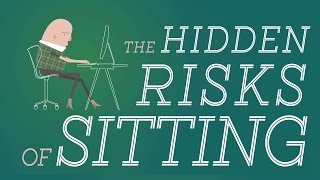(单词翻译:单击)
Right now, you're probably sitting down to watch this video
现在,你可能坐着看这个视频,
and staying seated for a few minutes to view it is probably okay.
花上几分钟坐着看完这个视频好像没什么问题。
But the longer you stay put, the more agitated your body becomes.
但是你坐得越久,你的身体就越焦躁不安。
It sits there counting down the moments until you stand up again and take it for a walk.
你的身体坐着数倒计时,直到你重新站起来带着你的身体走两步。
That may sound ridiculous. Our bodies love to sit, right? Not really.
这听起来可能很荒谬。我们的身体喜欢坐着,不是吗?不是的。
Sure, sitting for brief periods can help us recover from stress or recuperate from exercise.
的确,短时间地坐一会能帮我们从紧张的情绪中中恢复过来,或在运动后恢复体力。
But nowadays, our lifestyles make us sit much more than we move around,
但是如今,我们的生活方式使我们坐的时间远远大于我们活动的时间,
and our bodies simply aren't built for such a sedentary existence.
然而我们的身体并不仅是为了久坐而构建的。
In fact, just the opposite is true.
事实恰好相反。
The human body is built to move, and you can see evidence of that in the way it's structured.
人类的身体生来是为了运动。并且你能从人类的身体构造的方式中找到证据。
Inside us are over 360 joints, and about 700 skeletal muscles that enable easy, fluid motion.
我们全身有超过360个关节,还有大约700块骨骼肌,这让我们能够轻松流畅地做各种动作。
The body's unique physical structure gives us the ability to stand up straight against the pull of gravity.
人类身体独特的构造使我们能够对抗地心引力,笔直地立在天地之间。
Our blood depends on us moving around to be able to circulate properly.
我们的血液需要我们活动才能合理地循环。
Our nerve cells benefit from movement, and our skin is elastic, meaning it molds to our motions.
身体活动同时也会给神经细胞带来好处。而且我们的皮肤是有弹性的,它会随着我们的动作而变化。
So if every inch of the body is ready and waiting for you to move, what happens when you just don't?
所以,我们身体的每一寸都准备好了并期待着你去多活动,但如果你偏偏不动,我们身体到底会发生什么事?
Let's start with the backbone of the problem, literally.
让我们先来看看脊椎部分。
Your spine is a long structure made of bones and the cartilage discs that sit between them.
你的脊椎是一个长形的结构,骨骼和软骨交错其中。
Joints, muscles and ligaments that are attached to the bones hold it all together.
附着在骨骼上的关节,肌肉和韧带把它们紧紧地连结在一起。
A common way of sitting is with a curved back and slumped shoulders,
最常见的坐姿是弯着的背和下榻的肩膀,
a position that puts uneven pressure on your spine.
这个姿势往往给你的脊椎施加了不平均的压力。
Over time, this causes wear and tear in your spinal discs, overworks certain ligaments and joints,
日积月累,它会磨损你的腰间盘,使一些关节和肌肉过度劳损,
and puts strain on muscles that stretch to accommodate your back's curved position.
肌肉也紧绷着去迎合弯曲的背部。
This hunched shape also shrinks your chest cavity while you sit,
驼背坐着同时也缩小了你胸腔的空间,
meaning your lungs have less space to expand into when you breath.
这意味着,呼吸时肺部舒张没有足够的空间。
That's a problem because it temporarily limits the amount of oxygen that fills your lungs and filters into your blood.
这样就形成了一个问题,因为它暂时性地限制了填充肺部和滤进血液里的氧气容量。
Around the skeleton are the muscles, nerves, arteries and veins that form the body's soft tissue layers.
骨架的周围都是肌肉,神经,和动静脉,形成了人体的软组织层。

The very act of sitting squashes, pressurizes and compresses, and these more delicate tissues really feel the brunt.
这种坐姿,无时无刻不在向身体施加压力,而这些更为精细的组织真实地感受到了这种冲击。
Have you ever experienced numbness and swelling in your limbs when you sit?
当你久坐的时候,你有过四肢肿胀或者肢体麻木的感觉吗?
In areas that are the most compressed, your nerves, arteries and veins can become blocked,
这是因为在那些被挤压的最厉害的部位,你的神经,动脉和血管会慢慢堵塞,
which limits nerve signaling, causing the numbness, and reduces blood flow in your limbs, causing them to swell.
这阻断了神经信号的传导,引起麻木;并且这种堵塞减缓了你肢体中血液流动的速度,使你四肢肿胀。
Sitting for long periods also temporarily deactivates lipoprotein lipase,
同时,长时间的坐着会导致脂蛋白脂肪酶暂时性失效,
a special enzyme in the walls of blood capillaries that breaks down fats in the blood,
这是一种存在于毛细血管壁中降低血液中脂肪含量的一种特殊酵素。
so when you sit, you're not burning fat nearly as well as when you move around.
所以当你坐着的时候,你的体内几乎没有像你活动时那样分解脂肪。
What effect does all of this stasis have on the brain?
这种停滞和郁积对人的大脑又有什么影响呢?
Most of the time, you probably sit down to use your brain,
在很多时候,你大概都是坐着去思考问题,
but ironically, lengthy periods of sitting actually run counter to this goal.
但是讽刺的是,长时间的坐着却让你和你的初衷背道而驰。
Being stationary reduces blood flow and the amount of oxygen entering your blood stream through your lungs.
坐着不动使血液流动放缓,使通过肺部进入血液中的氧气减少。
Your brain requires both of those things to remain alert,
你的大脑需要所有这些东西去保持灵敏,
so your concentration levels will most likely dip as your brain activity slows.
随着你的大脑活动减慢,你的注意力集中程度有很大的可能性会降低。
Unfortunately, the ill effects of being seated don't only exist in the short term.
不幸的是,这种不良影响在短期内并不会发生。
Recent studies have found that sitting for long periods is linked with some types of cancers and heart disease
近期研究发现,长期坐着与某些癌症和心脏病存在特殊的联系,
and can contribute to diabetes, kidney and liver problems.
并且可能促成糖尿病,引起肾脏和肝脏的病变。
In fact, researchers have worked out that, worldwide, inactivity causes about 9% of premature deaths a year.
事实上,研究者已经发现,每年世界上过早死亡的案例中,不活动占据了9%的死因。
That's over 5 million people.
总数超过5百万人。
So what seems like such a harmless habit actually has the power to change our health.
这个看起来并没有多大害处的习惯,实际上却有影响我们健康的能力。
But luckily, the solutions to this mounting threat are simple and intuitive.
幸好,解决这个威胁的方法非常简单。
When you have no choice but to sit, try switching the slouch for a straighter spine,
当你只能坐着的时候,试着去抬头挺胸,
and when you don't have to be bound to your seat, aim to move around much more,
当你不需要被绑在座椅上时就更不用说了,试着去到处走走活动活动。
perhaps by setting a reminder to yourself to get up every half hour.
或者你可以给自己设一个提示,每隔半个小时起来一下。
But mostly, just appreciate that bodies are built for motion, not for stillness.
更多的时候,我们要感激人类的身体是为运动而生,而不是寂静。
In fact, since the video's almost over, why not stand up and stretch right now?
其实,这个视频也快到尾声了,为什么不趁现在起来走走?
Treat your body to a walk. It'll thank you later.
把走一走当作对你身体的小奖赏,它会在日后感谢你的。


